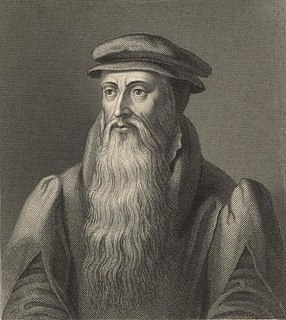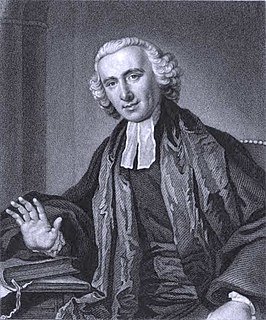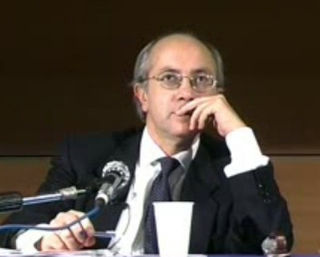Top 81 Augustine Quotes & Sayings - Page 2
Explore popular Augustine quotes.
Last updated on December 18, 2024.
Is it not lack of faith that leads men to fear the scrutiny of reason? If the destination is doubtful, then the path must be fraught with fear. A robust faith need not fear, for if God exists, then reason cannot help but lead us to Him. 'Cogito, ergo Deus est,' argues St. Augustine, 'I think, therefore God is.'
St. Augustine and St. Thomas define mortal sin to be a turning away from God: that is, the turning of one's back upon God, leaving the Creator for the sake of the creature. What punishment would that subject deserve who, while his king was giving him a command, contemptuously turned his back upon him to go and transgress his orders? This is what the sinner does; and this is punished in hell with the pain of loss, that is, the loss of God, a punishment richly deserved by him who in this life turns his back upon his sovereign good.
Now the Father draws us from the evil of sin to the goodness of His grace with the might of His measureless power, and He needs all the resources of His strength in order to convert sinners, more than when He was about to make heaven and earth, which He made with His own power without help from any creature. But when He is about to convert a sinner, He always needs the sinner's help. "He converts thee not without thy help," as St. Augustine says.
Though he avoided outright endorsement of the view, fifth-century Church Father Saint Augustine was clearly familiar with the theory of the spherical earth: "They [those who believe that "there are men on the other side of the earth"] fail to observe that even if the world is held to be global or rounded in shape, or if some process of reasoning should prove this to be the case, it would still not necessarily follow that the land on the opposite side is not covered by masses of water."
The Lord called me by the way of simplicity and humility, and this way He hath shown me in truth for me and those who will believe and imitate me. And therefore I would that ye name not to me any rule, neither of St. Augustine, nor St. Benedict, nor of Bernard, nor any way or form of living, but that which was mercifully shown and given me by the Lord.
People are mostly sane enough, of course, in the affairs of common life: the getting of food, shelter, and so on. But the moment they attempt any depth or generality of thought, they go mad almost infallibly. The vast majority, of course, adopt the local religious madness, as naturally as they adopt the local dress. But the more powerful minds will, equally infallibly, fall into the worship of some intelligent and dangerous lunatic, such as Plato, or Augustine, or Comte, or Hegel, or Marx.
The general consent of all that sect is that God (by his foreknowledge, counsel, and wisdom) has no assured election, neither yet any certain reprobation, but that every man may elect or reprobate himself by his own free will, which he has (say they) to do good or evil ... [All these things are] forged by their own brains, and polished by the finest of their wits, when yet in very deed they are but the rotten heresies of ... Pelagius, long ago confuted by Augustine.
The old truth that Calvin preached, that Augustine preached, that Paul preached, is the truth that I must preach to-day, or else be false to my conscience and my God. I cannot shape the truth; I know of no such thing as paring off the rough edges of a doctrine. John Knox's gospel is my gospel. That which thundered through Scotland must thunder through England again.
Augustine said that we were all born into the world of "common grace" [i.e., available to all]. Before one is baptized, or even if one never is, such grace meets one in God's creation. There is grace in the pear tree that blooms and blushes. There is common grace in the sea (that massive cleanliness which we are proceeding to corrupt), in the fact that there was, before we laid hands on it, clean air. Our task is to appreciate that grace.
There's a huge amount of work on Adam and Eve, from the ancient world to the present. Saint Augustine was obsessed with them.I don't know if it helps my research, but I get a big kick out of Mark Twain, who wrote "The Diaries of Adam and Eve." He wrote very funny stuff on them. I sometimes read things that are loosely related to what I'm thinking and writing about.
The woodchopper reads the wisdom of the ages recorded on the paper that holds his dinner, then lights his pipe with it. When we ask for a scrap of paper for the most trivial use, it may have the confessions of Augustine or the sonnets of Shakespeare, and we not observe it. The student kindles his fire, the editor packs his trunk, the sportsman loads his gun, the traveler wraps his dinner, the Irishman papers his shanty, the schoolboy peppers the plastering, the belle pins up her hair, with the printed thoughts of men.
[Milton's] argument is (a) St. Augustine was wrong in thinking God's only purpose in giving Adam a female, instead of a male, companion, was copulation. For (b) there is a "peculiar comfort" in the society of man and woman "beside, (i.e. in addition to, apart from) the genial bed"; and (c) we know from Scripture that something analogous to "play" or "slackening the cords" occurs even in God. That is why the Song of Songs describes a thousand raptures...far on the hither side of carnal enjoyment.
To each of my Nephews, William Augustine Washington, George Lewis, George Steptoe Washington, Bushrod Washington, and Samuel Washington, I give one of my swords or Cutteaux of which I may be Possesed; and they are to chuse in the order they are named. These Swords are accompanied with an injuction not to unsheath them for the purpose of shedding blood, except it be for self defense, or in the defense of their Country and its rights; and in the latter case, to keep them unsheathed, and prefer falling with them in their hands, to the relenquishment thereof.
For many years now, I have been an outspoken supporter of civil and human rights for gay and lesbian people. Gays and lesbians stood up for civil rights in Montgomery, Selma, in Albany, Ga. and St. Augustine, Fla., and many other campaigns of the Civil Rights Movement. Many of these courageous men and women were fighting for my freedom at a time when they could find few voices for their own, and I salute their contributions.
The barbarians, who possessed no books, no secular knowledge, no education, except in the schools of the clergy, and who had scarcely acquired the rudiments of religious instruction, turned with childlike attachment to men whose minds were stored with the knowledge of Scripture, of Cicero, of St. Augustine; and in the scanty world of their ideas, the Church was felt to be something infinitely vaster, stronger, holier than their newly founded States.
For what St. Augustine said is true, that one can sing nothing worthy of God save what one has received from Him. Wherefore though we look far and wide we will find no better songs nor songs more suitable to that purpose than the Psalms of David, which the Holy Spirit made and imparted to him. Thus, singing them we may be sure that our words come from God just as if He were to sing in us for His own exaltation. Wherefore, Chrysostom exhorts men, women, and children alike to get used to singing them, so as through this act of meditation to become as one with the choir of angels.
The fact is that philosophy has been a decisive source of inspiration in all the great crises that Europe has faced. It has been so in the time that preceded the fall of the Roman Empire, when Augustine of Hippo delineated the features of a new spiritual civilization; in the age of religious wars, when Descartes and Hobbes established the principles of modern science and politics; and at the turn of the French Revolution, interpreted by Kant and Hegel as an event destined to change the history of the world.
So saving grace, converting grace, for Augustine, is God's giving us a sovereign joy in God that triumphs over all other joys and therefore sways the will. The will is free to move toward whatever it delights in most fully, but it is not within the power of our will to determine what that sovereign joy will be.
"Happy he that knows Thee, even if he knows nothing else," says St. Augustine. If we knew all the sciences and knew not how to love Jesus Christ, our knowledge shall profit us nothing to eternal life. But if we know how to love Jesus Christ, we shall know all things, and shall be happy for eternity.
St. Augustine teaches us that there is in each man a Serpent, an Eve, and an Adam. Our senses and natural propensities are the Serpent; the excitable desire is the Eve; and reason is the Adam. Our nature tempts us perpetually; criminal desire is often excited; but sin is not completed till reason consents.
According to St. Bonaventure, all the angels in heaven unceasingly call out to her: "Holy, holy, holy Mary, Virgin Mother of God." They greet her countless times each day with the angelic greeting, "Hail, Mary", while prostrating themselves before her, begging her as a favour to honour them with one of her requests. According to St. Augustine, even St. Michael, though prince of all the heavenly court, is the most eager of all the angels to honour her and lead others to honour her. At all times he awaits the privilege of going at her word to the aid of one of her servants.



















